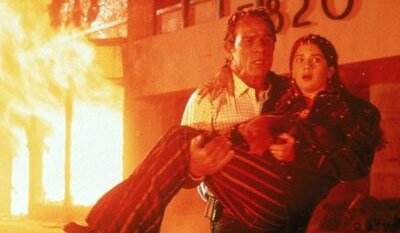|
|
| Volcano is built on Hollywood producer Sam Goldwyn’s bedrock: “a story that starts with an earthquake and works its way up to a climax”. |
| The point of this film is spectacle, and lots of it. Most disaster movies begin with half an hour spent establishing characters and a peaceful place where nothing terrible ever happens. There’s none of that here. From the opening credits, Los Angeles is presented by British director Mick Jackson as a place where man-made disasters - from drive-by shootings to New Age philosophising - are over-ripe for replacement by natural ones. |
| Within minutes, the ground is groaning as though in sympathy for long-suffering movie audiences, manhole-covers are popping like champagne corks after the Oscars, volcanic ash is falling on people like some demented advertisement for Head and Shoulders, and the citizens of Hollywood are running scared of being brained by downwardly mobile bimbos (those big-busted blondes on advertising hoardings can be lethal). |
| For anyone old enough to remember Richard Harris warbling “Macarthur Park is melting in the dark”, here’s the chance to see it happening. Volcano is worth seeing for the bigger than big set-pieces - the demolition of an eyesore tower-block in order to act as a concrete dam, or the helicopters and fire-engines bombarding a computer-generated sea of lava travelling west down Wilshire Boulevard. |
| The hero of the piece is the city’s workaholic head of emergency services (Tommy Lee Jones). He is supposed to be on holiday but - like Pierce Brosnan in the year’s previous eruption movie Dante’s Peak - just won’t quit. He’s meant to be looking after his thirteen year-old daughter (Gaby Hoffman), but he’s too busy and she doesn’t want to be treated like a child. |
| The heroine is a geologist (Anne Heche), who - though played by Hollywood’s most prominent lesbian and presented as a feminist scornful of Jones’s “macho, controlling” ways - is blonder and prettier than her cropped, bespectacled, suspiciously mannish female sidekick and is therefore - as disaster movie addicts will immediately spot - approximately 10,000 times more likely not to fall through a crack in the earth’s surface. |
| Despite being a scientist, Heche’s pronouncements don’t so much border on the banal as wade knee-deep into it. Of lava, for example, she says “This is going to destroy everything it touches!” Later, she expands on her area of expertise: “We are dealing with VERY DETERMINED STUFF here!” |
| Scentific and human interest within the picture is pretty much confined to seeing how many nasty ways innocent people can die - baked, fried or flattened being this movie’s particular favourites. |
| Dante’s Peak offered deeper scientific insights into the developing phases of a volcanic eruption, and showed a good deal more invention when it came to massacring its cast - some folks there were poached, drowned, and even eaten by sulphuric acid. |
| The characters in Volcano aren’t developed, so it’s hard to care much when, after two hours of being successfully macho and controlling, Tommy Lee Jones suddenly makes a resolution to be a more caring parent and get in touch with his feminine side; or when, having tended survivors worse off than herself, Gaby Hoffman becomes less of a demanding little girl and more of a nurturing little mother. |
| Even less convincing is the personality change when Ann Heche transforms miraculously from Jones’s feisty feminist equal into his obedient childfinding service. But who attends this kind of movie, expecting depth of character? |
| Compendium of disaster-movie cliches though it is, the film does occasionally do the unexpected. An insensitive, selfish developer is, against all the odds, allowed to live - though director Mick Jackson surely misses a trick in not showing him suffer when his new tower block is felled. |
| Most of the dialogue is blessedly drowned out by falling masonry, or consists of Tommy Lee Jones yelling incomprehensible instructions like (my particular favourite) "See that, that and that? Now watch this!" |
| Occasional, more sophisticated exchanges of dialogue - such as one between workers on the merits of Hieronymus Bosch - suggest that the screenwriters’ intelligence exists, and has merely been put on hold for the duration of the movie. |
| Ann Heche has the best comment on the action: "This city is finally paying for its arrogance!" I would have liked more perceptive social comment along these lines, and far more evidence of L.A. craziness and hubris to back it up. The film would have been more entertaining had it contained some sincere malice towards the L.A. lifestyle,. It might even have achieved some deeper resonance as a Biblical epic for our times - a modern destruction of Sodom and Gomorrah. Still, I can understand why Hollywood might be reluctant to soil its own nest. |
| The movie’s message for humanity is much more bland. Whereas in the Sixties all we needed was love, in the Nineties it seems all we need to bring us together is lava. The purpose of natural disaster here is to heal ethnic divisions in Los Angeles. The key event is when, after some unfortunate misunderstandings about looting and harassment, a white racist cop and a black homeboy with a bad attitude start working together for the good of the community. |
| At the end, an innocent child sees everyone with ash on their faces and coos “They all look the same!” Yeah, kid, but then they wash it off. |
|
|
